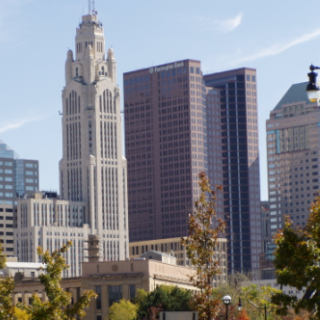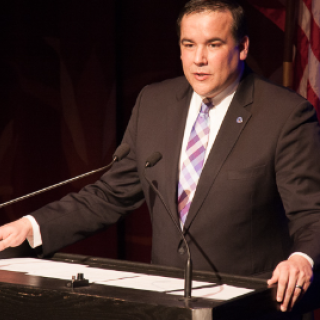Advertisement
We have seen this act before. It always appears innocent to the untrained eye, but those who pay close attention can sense when something is rotten in Denmark, or in this case Dennison Place.
Concerned citizen Frank Zindler smelled something foul in his neighborhood when he was notified that this year he wouldn't be voting at the Thompson Community Center, where he's cast his ballot for three decades. Instead Frank was told to go to the Ohio Student Union on campus to exercise his franchise.
On the surface it sounds like a reasonable replacement for his usual polling station. It's public, it's open and easy to find. How can anyone complain they are being inconvenienced, as Frank did?
Frank saw a fly in the ointment when he launched a recon mission to scope out the new polling place. What he found caused him to write a letter to the Columbus Dispatch.
In that letter he explained a clear and present danger to his neighbors' voting rights. There's no place to park.
Sure, there's a fairly large parking garage attached to the Ohio Union. But, as Frank pointed out in his letter, there's just one itty bitty problem. Turns out those garages are only open to those with key cards. The general public can't enter them until after 4pm.
In Frank's mind, that's the sort of thing that just might keep some of his elderly neighbors, and perhaps some less motivated voters, from casting a ballot.
And so he wrote a letter to the Dispatch, who called him to verify he had written the letter, something they do if they think they might publish a letter. But the Dispatch did not publish the letter. Frank believes that what the Dispatch did do was call the Franklin County Board of Elections. He can't prove that, nor can we, but soon after hearing from the paper he got a letter from Franklin County BOE.
"To alleviate this concern, we have worked with The Ohio State University [not the private company now running the parking business?-Frank's question] to provide vouchers to every person that needs to park in one of the university parking garages in order to vote. When you sign in at the polling location at the Ohio Union, please mention to poll workers that you are parked in one of the university garages and they will provide you with a pass to exit the garage at no cost."
In an email to me, Frank wondered about a few things.
“How nice!” he wrote. “If you can't get into the garage in the first place, how will you get a voucher and for what will you use it?
“I am worried that there may be a wider importance to this case. The consolidation of precincts may not be important for off-year elections, but if it is primarily in Democratic areas during a major election it may produce the outrageously long lines we experienced preceding the accession to the throne of King George II. I admit that the closure of the Thompson Community Center gives a slight justification for changing the voting site, but why wasn't a small, accessible alternative site chosen? An oversight? I doubt it.”
You are not alone.
Frank emailed me several times Tuesday afternoon. He was on another mission. He found that the first entrance to the parking garage still prohibited public parking before 4pm, while the second entrance had no such barrier. However, as Frank pointed out to me, there was no way of knowing if his neighbors were also told by Franklin County BOE about parking vouchers.
“It would appear that my letter to the Dispatch did in fact ameliorate somewhat the situation in my precinct. I am certain that this would not have happened if the editor had not contacted the FCBE. I doubt that any letter was sent out to all registered voters. If it had been sent, surely it would have told them to look for the second entrance to the parking garage, wouldn’t it? Even so, it is hard to underestimate the impact on my elderly neighbors during an off-year election of the specter of having to go to so forbidding a site as the Ohio Union. My guess is that some of them have never been in a parking garage.”
Thanks, Frank, for caring enough about the election process to have taken as many steps as you did to uphold your neighbors' right to vote.


